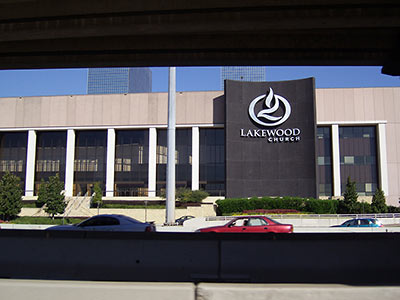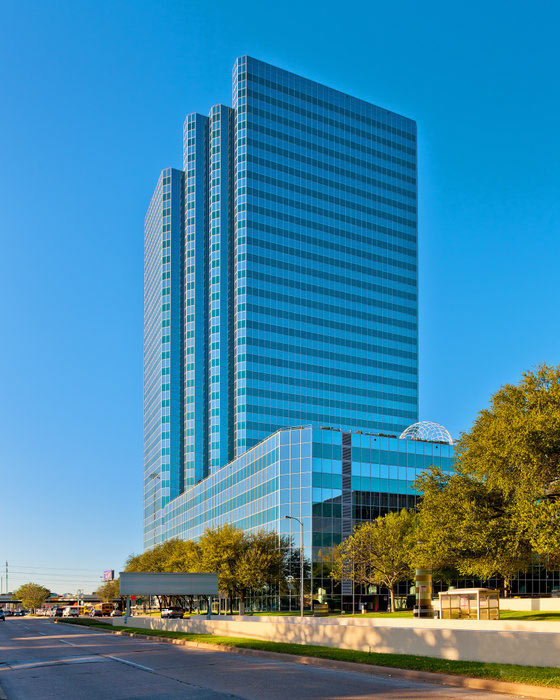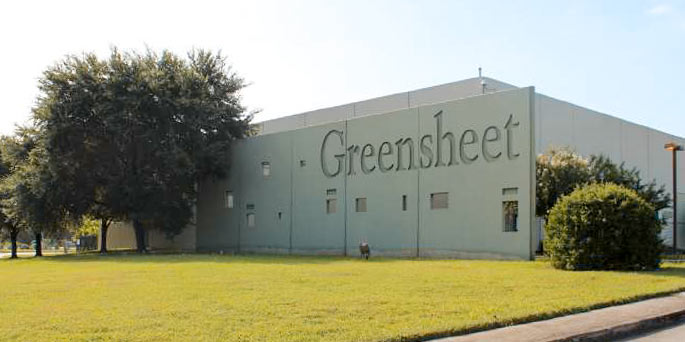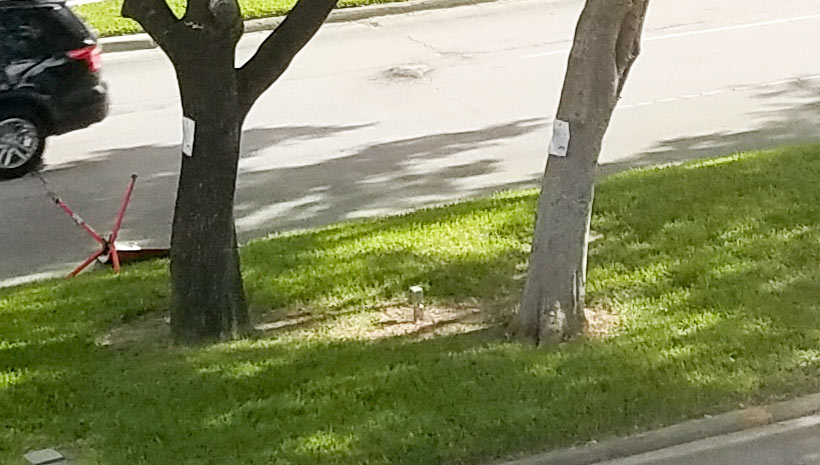
City officials are discussing a possible sale of the former basketball stadium now occupied by the nation’s largest megachurch, reports the Chronicle‘s Nancy Sarnoff. When Lakewood Church took over the Compaq Center (formerly the Houston Summit) from the city in 2001, the institution prepayed the entire $12 million rent amount of the 30-year lease, and spent considerably more than that on renovations. The city won’t see any more income from the property for 22 years. According to the agreement, Lakewood has the option of extending its lease for a second 30-year period, for $22.6 million.
How much could the city get for the little church by the Southwest Freeway?
***
David Lewis, CEO of Lewis Realty Advisors, said the value of the city’s interest in the property is in the $8 million range.
Sarnoff deadpans:
The timing of the city’s wish to sell its properties isn’t ideal.
The economic downturn has led to a widespread credit crunch and declining property values.
More commercial real estate owners are filing for bankruptcy protection or losing properties to their lenders.
Still, the city believes now could be a good a time to try to unload real estate.
In October 2008, the city pulled a number of properties it had for sale off the market because of weak bids.
A year later, however, a property auction yielded better results.
“Unless someone can convince me that this market is going to turn around any time soon, we think that now is as good a time as we may have to make some of these sales,†[city real estate salesperson Bob] Christy said.
If you’re looking for a deal of your own, the city doesn’t have any more churches or stadiums available — but might you be interested in a library or two?. Here’s the Chronicle‘s list of city properties for sale:
- Old Galveston Road/Beltway 8
- 1115 South Braeswood
- 8000 North Stadium
- 1109 Antoine
- 801 Gillette St.
- 107 W. 12th St. (Old Heights Fire Station)
- 14330 Memorial Drive (Kendall Library)
- 10115 Kleckley (Bracewell Library)
- 3100 West Fuqua (Vinson Library)
- 6440 W. Bellfort (Frank Library)
- 10803 Ella (Original Fire Station 84 site)
- Battleground Road (CWA pump site)
- Luce Bayou Diversion Site (CWA pump site)
- 3602 Center St. (Heights Recycling Center)
- 4400 Langfield (Proposed Bingle Road Fire Station 50)
- 3300/3400 Main St. (Permit facility)
- Lakewood may buy former Compaq Center [Houston Chronicle]
- Previously on Swamplot: Joel Osteen on Real Estate: Enlarge Your House by Enlarging Your Vision
Photo of Lakewood Church, 3700 Southwest Fwy.: viajero28





Nancy should look into the time value of money, Lakewood has it tied up for 50+ years, they are the only buyer in this or any market, boom or bust. New FASB rules are likely driving the deal.
I’m not alone in thinking that “Religious” organizations who make money on endeavours unrelated to ministering to their flock should be taxed on all the money they are making.
A certain Southwest Houston Baptist church runs an eye clinic. Is it free, are there no profits, can poor people go there to get free glasses? That’s a story I’d like to read.
I really can’t believe Compaq Center is only worth $8 million. The land is probably worth three times that. Maybe the Osteens promised Bill White they would endorse him if he pulled a little string for them.
The Osteens. Our very own version of Jim and Tammy Faye. Sooner or later they’ll get caught at something. Just wait.
Hopefully it will be this little sweetheart deal and they will take Bill White down with them.
Maybe $8 million is all that’s left after CoH returns the bulk of the $12 million that Lakewood paid up front for the 30-year lease.
But actually, $8 million is not what they’re saying the property would sell for in an open market. They’re saying that’s “the value of the city’s interest in the property”… whatever that is.
Guys, it’s an NPV calculation. Lakewood has the rights to the church for 30 years and prepaid its rent to the City. The buyer of the facility therefore has to pay property taxes until 2031 until it might **possibly** be able to spend millions in demolition costs to get at the land. But of course, if Lakewood re-ups on what was probably a sweetheart deal then the owner would realize a pittance for rent and have to pay property taxes for **another** 30 years before being able to get at the land. Alternatively, the owner could buy Lakewood out of its lease, but it’d probably have to wait until the Osteens are ready to retire and that’s just so much larger an outlay to offset the “value of the City’s interest” in the property.
.
The difference between the “City’s interest” and “market value” is an impairment against the property created by the unfavorable terms of a lease.
Well I remember how contentious the debate was to begin with. Sounds like everyone should have been more concerned with separation of the taxpayers and their dollars instead of separation of church and state. Any way you look at it obviously Joel Osteen got quite a deal.
Today’s Houston Chronicle reports that the City of Houston may be selling the property and improvements where Lakewood Church is located to Lakewood Church.
Without seeing how the lease was structured, this may be too simple of a simple way of looking at this, but I fail to see how selling the Lakewood property and building to Lakewood Church for only $7.5 million is a fair deal for the City of Houston and its citizens. While it is theoretically tied up in a lease (with what many would call sweetheart terms) for the next 50 years, the land alone has a present day value of $15 million based on HCAD appraisals.
A search of the HCAD (Harris County Appraisal District) site shows a 2009 land value of $66,775,750 for the adjacent Crescent Realty property at 3800 Buffalo Speedway. This is where the Greenway Plaza office buildings are located. The HCAD appraised land area of this property is 1,335,515 square feet or $50 per square foot. The Lakewood property next door is 302,507 (~6.9 acres) square feet which implies a land value alone of $15,125,500 in 2009 dollars, well above the proposed sales price of $7.7 million for the land and improvements (church structure). HCAD values for the Lakewood property show $0, I assume since it is city owned. Granted that Lakewood prepaid $21 million of rent which makes the valuation a little tricky, however, if you only look at the present value of the land alone (i.e. tear down the Summit) and the discounted future value of the lease payments in the extended term from 2034 to 2064 of $753,333 per year you get a present day valuation of this deal of anywhere from $18.8 million ($15.1MM + $3.75MM) to $26.9 million ($15.1MM + $11.75MM) based on discounting the future lease payments by 20% to 10% annually in the respective calculations.
The Crescent property’s appraisal increased an average of 3.23% per year from its HCAD land value in 2006 to 2009, this included a $20 million drop in value from 2008-2009. This implies a future value of the Lakewood land of $32 million in 2034 when their lease renews and $84 million in 2064 at the end of the lease based on an average land value increase of 3.23% per year. While these are interesting values, they all go back to the land probably being worth at least $15MM today.
Obviously a for profit investor would have to pay property taxes for twenty more years while having no income until 2034 due to the prepaid rent, however, this could be accounted for via a tax abatement or greater discount on the sales prices, though still more than the reported $7.5MM pricetag.
So what do I suggest the city do? There are many land owners in the city who do long term leases but opt to retain the underlying ownership of the land. The land that the Whole Foods by River Oaks is built on is a good example as are many other properties in Houston. 100 year leases are common in places like Singapore where the landowners opt to hold onto the land and do a groundlease. I reccomend that the city not take such an urgent short term view and, in effect, give the property away to Lakewood in a distressed sale but investigate their options of monetizing the value of the land and lease payments at a much higher value by working with real estate investors with a longterm mindset whether they be US, Latin American, Middle Eastern, Indian, or Chinese investors. This is likely to produce a much better outcome for the citizens of Houston.